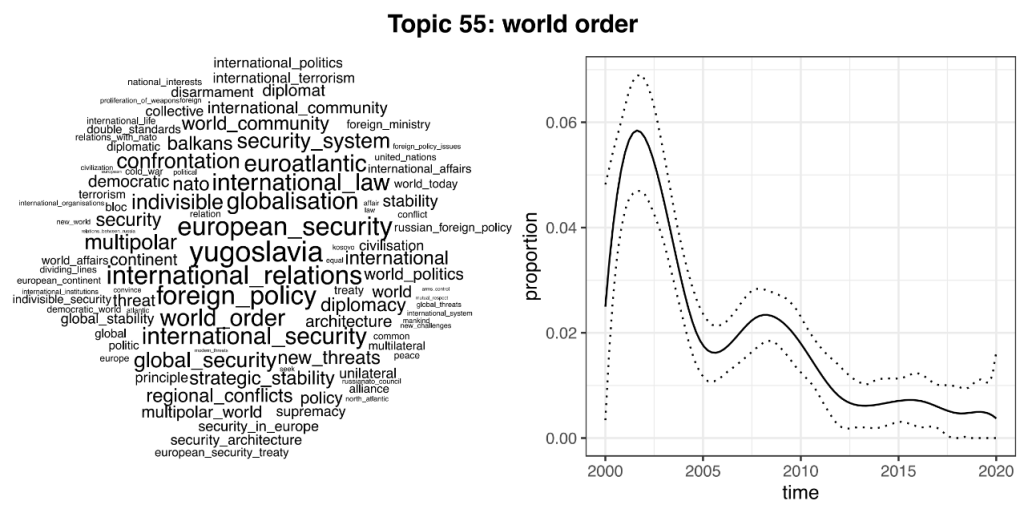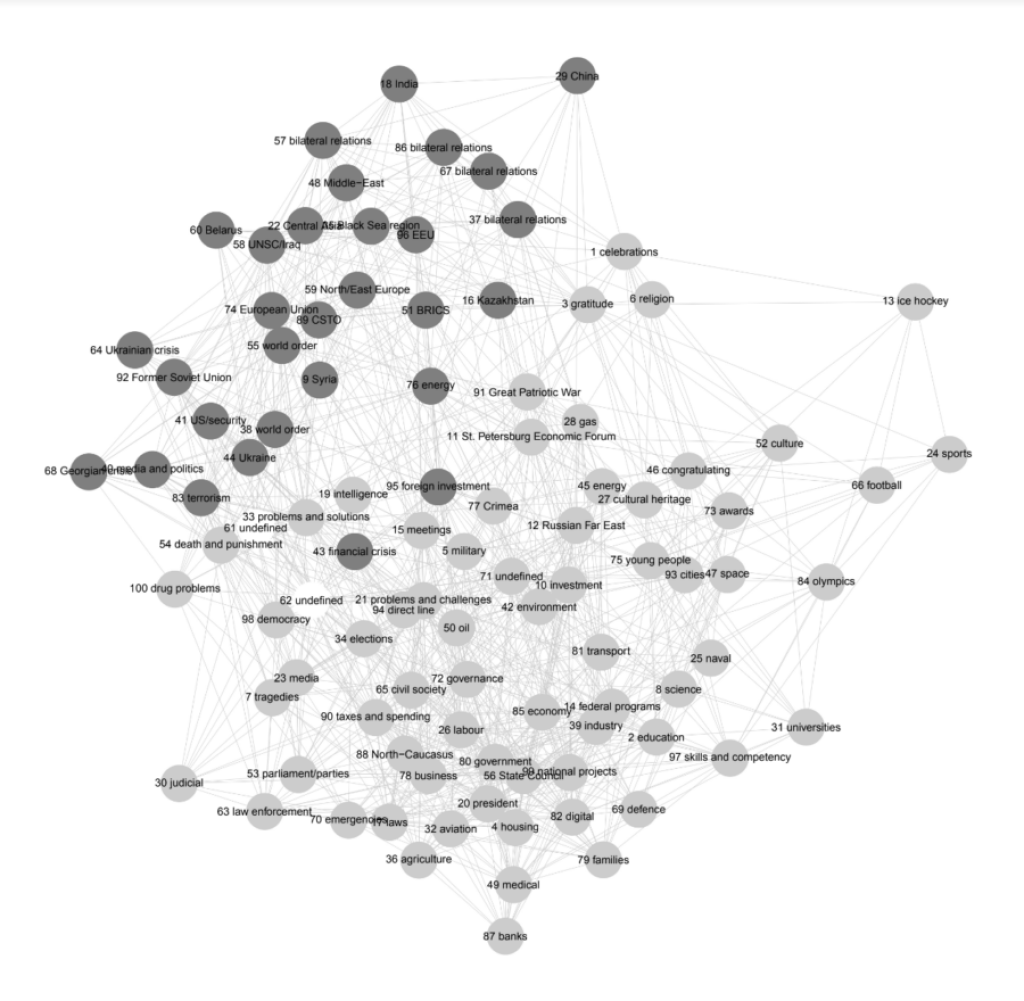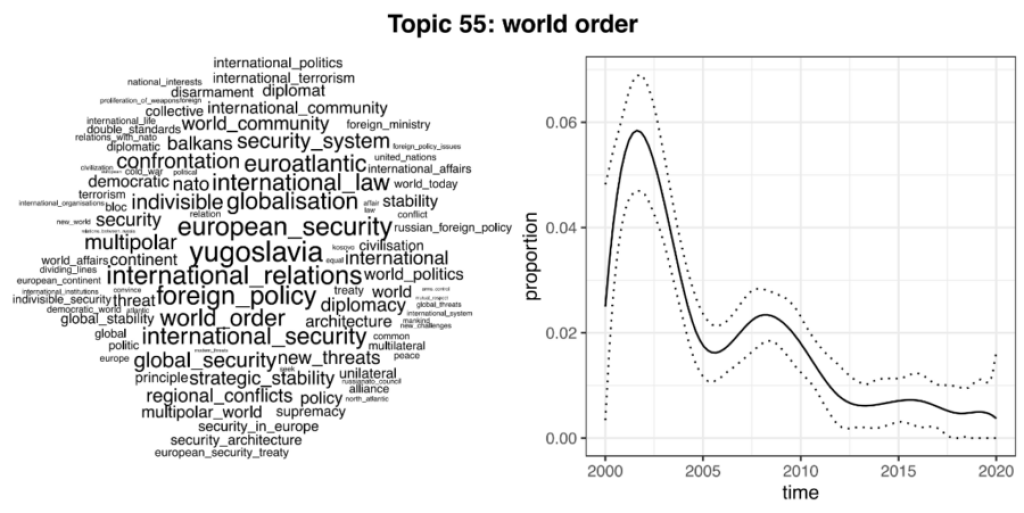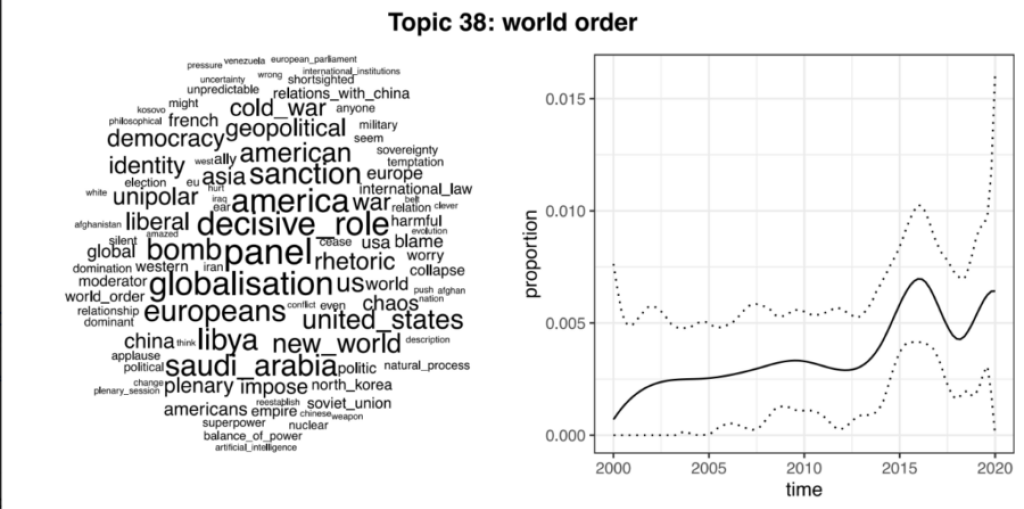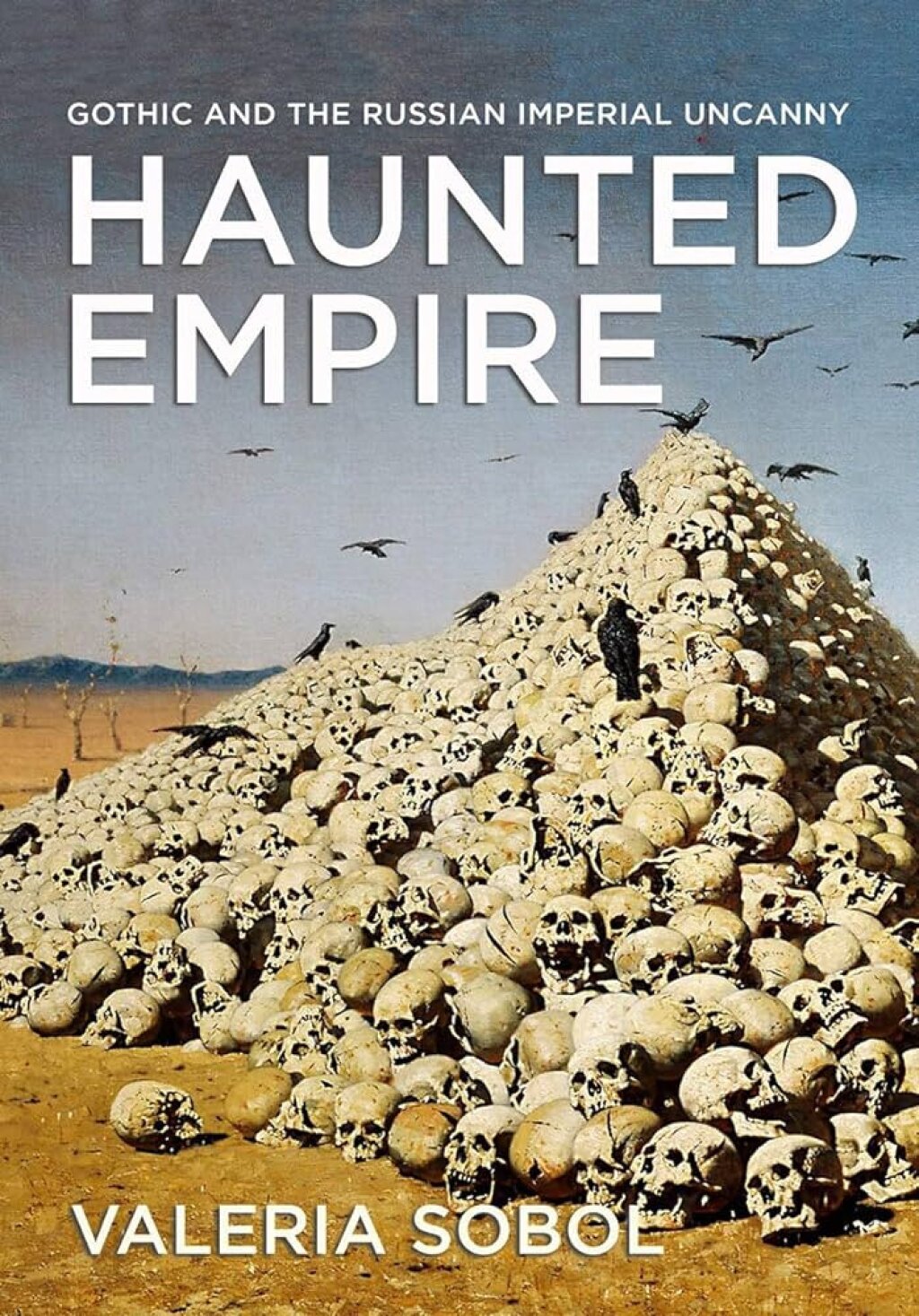Martin Mölder is a researcher in comparative politics at the Johan Skytte Institute of Political Studies at the University of Tartu who, among other things, focuses on quantitative text analysis in different contexts.
Eiki Berg is Professor of International Relations Theory at the Johan Skytte Institute of Political Studies at the University of Tartu who specializes, among other things, in geopolitics, de facto states, and secessionist conflicts.
This post is based on an article that appeared in a 2023 issue of Europe-Asia Studies.
This analysis examines shifts in Russian political discourse during the Putin era. Our focus is the move from expectations that Russia would align itself with the West to the understanding that it would pursue its own national interests even when these conflicted with Western norms. Russia has employed a mix of diplomatic and coercive measures in neighboring states to assert its influence on the global stage. This assertiveness is closely linked to Russia's fundamental identity and its desire for acknowledgment within the global order.
The tide in Russian-Western relations began to turn with the Kosovo conflict in 1999, when both the West and Russia started to justify military intervention even without UN approval. This process allowed Russia to perceive unilateral actions as a challenge to its role in the global order, leading to its direct involvement in Georgia and Ukraine under the same pretext of “safeguarding human rights,” at least on the discursive level. Russia's stance shifted from an initial alignment with the West to a more confrontational approach, exemplified by Putin’s pivotal Munich speech in 2007.
Perspectives on Russia’s role in global affairs have differed. It has been portrayed as, respectively, an advocate of the status quo upholding the rule of law; a neo-revisionist actor aiming to reshape the global order; and a reform-minded state pursuing gradual adjustments in international norms. These viewpoints underscore the evolving nature of Russia’s foreign policy orientation. The increasing assertiveness of Western players in regions neighboring Russia redirected Russian attention toward secessionist conflicts, affecting both its domestic and foreign policy.
Putin’s government has adopted a form of neo-authoritarian governance known as “sovereign democracy,” which places an emphasis on self-reliance in international affairs and maintaining control over its own narrative. The Kremlin exerts significant influence over media outlets and the flow of information, shaping how both elites and the general public perceive themselves and the world. Recognizing the significance of conveying its narrative to a global audience, Russia places high importance on foreign policy communication through mass media.
Press releases and transcripts serve as the primary means of communication between the government and the public, conveying information and shaping public opinion. They mirror Russia’s political positions and act as tools for molding the narrative. Our analysis of political discourse in Russia is based on 8200 English-language transcripts from the Kremlin’s official website, spanning the period from 1 January 2000, to 31 December 2019. The content includes speeches, interviews, discussions, and statements by the presidential administration, primarily President Vladimir Putin. We argue that, even as Russia occupies more and more of the Western foreign policy agenda, the Kremlin is becoming less concerned about raising foreign policy issues in its own political discourse.
The analysis employs topic modeling, an unsupervised machine learning technique, to classify texts into various “topics” or themes based on the co-occurrence of words within the texts in the corpus. This method helps uncover underlying themes in the transcripts. More specifically, we use structural topic modeling (STM) to reveal the topics and explore the relationship between the prevalence of topics and characteristics of the documents, like the time of their production. This approach allows for testing hypotheses on how topics evolve over time.
Topics are classified into either foreign policy or domestic content categories based on their thematic relevance to international or domestic issues, respectively. Some topics remain undefined due to a lack of specific themes. An analysis of the relationships between topics reveals two clear groupings: one related to domestic matters, and another focused on foreign policy. Some foreign policy topics are intertwined with domestic issues, while others are distinctly foreign.
The following figure shows the associations between topics, with foreign topics marked in darker grey while domestic topics are a lighter shade.
Several notable observations arise from the topic structure relating to discussions of conflicts in Kosovo, Georgia, and Ukraine, as well as Russian-Western relations. Crimea is placed within the “domestic” cluster, confirming its classification as a domestic topic. Furthermore, distinct topics are identified for the Georgian and Ukrainian crises, closely linked to topics concerning global order and international security. Additionally, Ukraine emerges as a distinct topic beyond the 2014 crisis, signifying its recurring presence in the discourse.
The analysis reveals a significant transformation in how the Kremlin addresses foreign and domestic matters. Of the topics more prominent before 2008, 6 were domestic, while 16 related to foreign affairs. Yet after 2008, the more prominent topics included 37 domestic ones but only 8 that were foreign policy-related. This change reflects a pronounced pivot away from foreign policy matters towards domestic issues.
This shift is also evident if we look at the proportion of the corpus that was devoted to either foreign or domestic issues. During the period under consideration, the overall proportion of press releases devoted to foreign topics experienced a noticeable decline. In 2001, half of the content of the press releases was dedicated to foreign affairs, but by 2011, this figure had plummeted to roughly 20%. Although there was a slight resurgence from 2011 to 2014, the prevalence of foreign topics again diminished following the 2014 events in Ukraine. Towards the end of the period, there was a renewed but limited emphasis on foreign topics, constituting around 30% of the content of the press releases.
Analyzing specific foreign policy topics that exhibited changes between the pre- and post-2008 periods offers further evidence of a shift towards domestic issues and different, more constrained foreign policy outlook. Out of 30 foreign policy topics, six displayed no clear distinction between the two periods in question. While a few topics gained prominence after 2008 (such as “Syria,” “BRICS,” and “bilateral relations”), twice as many foreign policy topics were more prominent before 2008 (including “European Union,” “diplomacy,” and “terrorism”). Notably, post-2008 foreign policy topics no longer included specific references to Western countries, which sharply contrasted with the pre-2008 era. Thus, between 2008 and 2019, the Kremlin shifted its discourse away from Western countries, concentrating more on nurturing relations with non-Western nations.
Our analysis also identified two distinct topics concerning “world order” (see figures below). The first, associated with the period before 2008, emphasized international law, security, and a multipolar world order, conveying a positive and engaged perspective on international affairs. The second, from after 2008, emphasized the role of the United States and a unipolar world order, featuring terms like “sanctions,” “violence,” and “uncertainty.” These divergent views on world order signify a remarkable shift in Russia's international relations stance.
Our findings analyze the Kremlin’s political discourse to reveal Russia's evolving priorities. After 2008, we can observe a shift away from foreign policy and Western countries and an increased focus on domestic concerns and non-Western relationships. This transition is evident in the changing significance of specific topics and their association with varying perspectives on global order.

